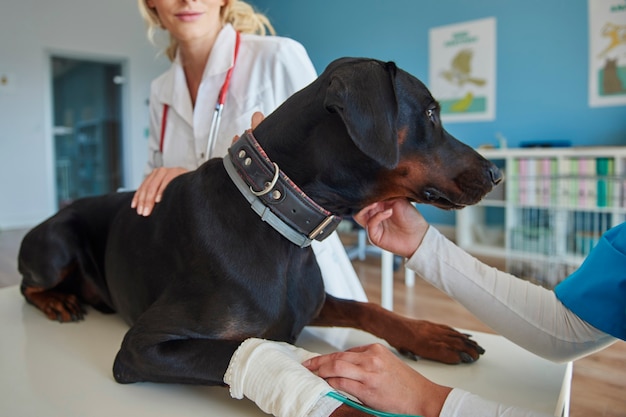Preventing Joint Problems With Pet Physical Therapy


Preventing Joint Problems With Pet Physical Therapy
When your dog or cat struggles to rise from their bed or seems hesitant to play as they once did, it is natural to worry about their long-term mobility and comfort. Joint issues can affect pets of any age, but the good news is that proactive care can make a tremendous difference in preserving their independence and quality of life. At Alpha Animal Rehab & Fitness, located at 975 Bloomfield Ave, Suite 1, West Caldwell, NJ 07006, our specialized veterinary team is dedicated to helping pets in West Caldwell and surrounding communities build stronger, healthier joints through targeted canine physical therapy and fitness programs.
In this blog, we will explore how regular physical therapy and customized exercise routines can help prevent joint problems, ease chronic pain, and keep your pet active well into their senior years. You will discover how early intervention with canine physical therapy in West Caldwell can support joint health, what signs to watch for, and which steps you can take at home to help your pet thrive. If you have ever searched for a "rehabilitation vet near me" or wondered how to find the right specialist to support your pet's mobility, this guide is for you.
Our approach centers on advanced techniques such as therapeutic exercise for pets and modalities like underwater treadmill sessions, ensuring every pet receives the highest standard of care. If you would like to explore these options in more detail, you can find more information about our underwater treadmill services and how they support joint health.
Recognizing the Early Signs of Joint Problems in Pets
Identifying joint issues in their earliest stages is crucial for successful prevention and management. Many pet owners notice subtle changes before more obvious symptoms appear. Pets may be less eager to go for walks, take longer to rise after resting, or show reluctance to jump onto furniture. Other early signs include stiffness, mild lameness, or favoring one limb. Dogs might hesitate on stairs or tire more quickly during play, while cats may groom less or avoid high surfaces they once enjoyed.
As joint problems progress, symptoms can become more pronounced. These may include persistent limping, visible swelling around joints, difficulty standing or lying down, and behavioral changes such as irritability or withdrawal. Some pets develop muscle loss due to reduced activity, and you might notice a decrease in their overall enthusiasm.
If you observe any of these signs, consider them important clues that your pet may benefit from a professional evaluation with a specialist veterinarian. Early recognition and intervention can prevent minor discomfort from becoming a chronic, debilitating issue.
Understanding Why Joint Problems Develop in Pets
Joint problems in dogs and cats arise from a combination of genetic, developmental, and lifestyle factors. Large breed dogs are often more susceptible to conditions like hip dysplasia or cruciate ligament tears, while cats may develop arthritis as they age. Obesity plays a significant role in accelerating joint degeneration, as excess weight places additional strain on bones and soft tissues.
Pets who have experienced injuries or repetitive stress on their joints are also at higher risk. This might occur in active dogs who participate in agility, working breeds, or pets who have suffered trauma. Additionally, certain congenital conditions can predispose pets to joint instability or malformation.
Normal aging is another common contributor. As pets grow older, the cartilage that cushions their joints gradually wears down, leading to pain, inflammation, and reduced mobility. Without intervention, these changes can significantly impact a pet's daily comfort and willingness to move.
Environmental factors, such as slippery floors or lack of routine exercise, can also play a role. For pets living in more urban areas like West Caldwell, limited access to safe outdoor spaces or seasonal weather changes might affect activity levels and joint health.
Professional Treatment and Management: The Role of Canine Physical Therapy
Specialized veterinary rehabilitation is at the heart of preventing and managing joint problems. Canine physical therapy in West Caldwell provides a comprehensive, evidence-based approach to supporting joint health, whether your pet is recovering from injury, surgery, or simply aiming to maintain long-term mobility.
Our veterinary professionals employ a variety of advanced modalities tailored to each pet's unique needs. Therapeutic exercise for pets is designed to gently strengthen muscles, improve flexibility, and enhance balance, all of which reduce the risk of further injury. This may involve controlled movements, stretching routines, and targeted activities that challenge specific muscle groups without overloading delicate joints.
One highly effective technique is underwater treadmill therapy, which allows pets to exercise with reduced weight-bearing, minimizing joint stress while maximizing cardiovascular and muscular benefits. You can learn how this unique modality supports mobility and joint health by visiting our underwater treadmill service page.
Manual therapy is another cornerstone of our approach, involving hands-on techniques to relieve tension, improve range of motion, and alleviate discomfort. Our team may also recommend adjunctive therapies such as laser therapy to reduce inflammation and promote healing, or assistive devices like braces, harnesses, and carts for pets who need extra support.
For cats facing mobility challenges, our cat rehabilitation and physical therapy services are specifically designed to address their unique anatomy and behavioral needs, ensuring feline patients receive the same high level of care as dogs.
Weight management plays a pivotal role as well. Maintaining an ideal body condition lessens joint strain and helps slow the progression of degenerative changes. If you are interested in learning more about this, our weight management services offer tailored plans to support your pet's health journey.
Preventive Strategies and Home Care for Joint Health
While professional rehabilitation is essential, pet owners can also make a significant impact through proactive home care and lifestyle choices. Daily low-impact exercise, like gentle walks or interactive play sessions, helps maintain muscle strength and joint flexibility. Providing non-slip surfaces, such as rugs or mats, can prevent accidental slips and falls that might worsen joint conditions.
Monitoring your pet’s weight is crucial; even small reductions in body fat can greatly decrease joint stress. Feeding a balanced diet that supports joint health, sometimes with the guidance of a veterinary nutritionist, can also be beneficial. For some pets, joint supplements containing glucosamine, chondroitin, or omega-3 fatty acids may be recommended, but always consult with a veterinary professional before adding new supplements to your pet's regimen.
Regular check-ins with a rehabilitation veterinarian near me can help detect early changes and adapt your pet's exercise routine as needed. Our fitness services are designed to maintain and improve pets' physical fitness and mobility, supporting their overall well-being.
Establishing a routine that includes both structured exercise and opportunities for mental stimulation maintains your pet’s enthusiasm for movement. Enrichment activities, such as puzzle feeders or scent games, can encourage older or less active pets to remain engaged and mobile. Always adapt activity levels based on your pet’s abilities and any recommendations from your veterinary team.
When to Seek Help From a Specialist Vet Near Me
Knowing when to consult a specialist is vital in preventing minor joint issues from progressing to more serious problems. You should seek professional evaluation if your pet shows persistent lameness, reluctance to move, or any signs of pain that do not resolve within a day or two. Sudden changes in behavior, such as avoidance of stairs or difficulty rising, warrant prompt attention.
If your general veterinarian identifies underlying orthopedic or neurologic conditions, a referral to a rehabilitation specialist is often the next step. Our team collaborates closely with referring veterinarians in West Caldwell and surrounding communities to develop individualized care plans that address both immediate discomfort and long-term health goals.
Pets recovering from surgery or injury benefit greatly from early rehabilitation, as timely intervention can accelerate healing, restore function, and reduce the risk of future issues. Likewise, senior pets who have begun to slow down can regain confidence and mobility through carefully managed exercise and supportive therapies.
Should you have questions about your pet’s mobility or wonder if canine physical therapy in West Caldwell is the right option, do not hesitate to reach out to our experienced veterinary professionals for guidance and support.
Take the Next Step Toward Lifelong Mobility
Proactive care is the key to keeping your dog or cat active, comfortable, and independent throughout their life. With advanced canine physical therapy in West Caldwell, your pet can enjoy the benefits of customized exercise routines, cutting-edge modalities, and compassionate support from rehabilitation veterinary experts. Investing in preventive care today can help your pet avoid pain and limitations tomorrow.
If you are searching for a "specialist veterinarian near me" or want to explore how therapeutic exercise for pets can enhance your companion’s quality of life, we invite you to connect with Alpha Animal Rehab & Fitness. Our team is dedicated to serving pets in West Caldwell and surrounding communities, offering a warm, supportive environment where every patient receives individualized attention.
To learn more about our rehabilitation programs or to schedule a consultation, call us at (908) 454-2273 or visit our website. Explore additional resources about therapeutic exercise for pets, or discover how our senior dog care services are tailored for dogs facing joint and mobility challenges. Your pet’s comfort and happiness are our top priorities, and we look forward to being your trusted partner in lifelong mobility.
Medical Disclaimer: This blog is for informational purposes only and does not replace professional veterinary advice. Always consult your veterinarian or a veterinary specialist for specific concerns about your pet’s health.



